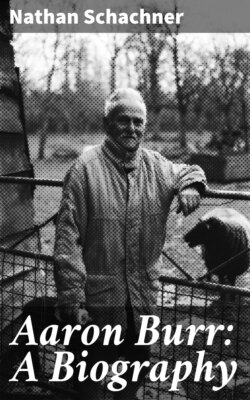Читать книгу Aaron Burr: A Biography - Nathan Schachner - Страница 20
На сайте Литреса книга снята с продажи.
1. The Call to Arms
ОглавлениеTable of Contents
Aaron Burr was then nineteen, some five feet six inches in height, slight of build, but wiry and capable of prolonged exertions. His year of so-called idleness, coupled with a healthy outdoor existence and the sports he loved, had rebuilt the reserves he had lost in that first year’s arduous application at college.
The news of Lexington crashed like a thunderbolt into the placid existence and gallantries of Litchfield. Burr threw his books away forthwith. He was young, ardent, and enamored with the military life—he had been reading history of late, with especial attention to the accounts of battles and sieges and the stratagems of great soldiers. And the “rights of man,” the “laws of nature,” were phrases that spread their glamour for him equally with others of his age, and made righteous and just a revolt against the alleged tyranny of a far-off England.
He wrote immediately to his friend Ogden, urging him to come at once to Litchfield, so that they might volunteer for service together. Ogden was less impetuous; he wrote back that he must first make certain arrangements. Meanwhile events moved rapidly. The battle of Bunker Hill was fought, and the Americans had stood the test of a pitched battle with British regulars.
In an ecstasy of impatience Burr hurried to Elizabethtown to hasten his slothful friend; with such success, that in July, 1775, the two lads were riding into Cambridge where the hastily summoned American forces were encamped. They had with them a letter from John Hancock addressed to General Washington recommending “Mr. Ogden and Mr. Burr of the Jerseys.”[61]
But here disillusionment awaited them. Washington had been only recently placed in command, and an almost impossible task presented itself to him. There were some 17,000 raw recruits in the scattered camps investing Boston; without the slightest semblance of discipline, unorganized, poorly armed, without uniforms or supplies. The officers were in little better state. Very few of them had either practical or theoretical knowledge of warfare. A commissary had to be established, drills performed, powder and shot procured, companies organized—in short, an army had to be forged out of a mere conglomerate mass.
Naturally the harassed Washington had little time to hearken to letters of recommendation. If the eager volunteers ever got to the Commander with an offer of their services, they were evidently put off with vague phrases. In any event, they wandered about the camp, footloose, becoming increasingly disgusted with the wretchedness and disorder of the camp, wondering when the war was to begin. Nowhere in Burr’s histories of military campaigns was there precedent for such squalor, ignorance, petty jealousies, inefficiency. Heroic exploits were far removed from the ragged men they met at Cambridge.
Young Aaron’s spirits effervesced into a high fever at the disappointment. He betook himself to bed. The others, Matthias Ogden and their mutual friends, were no less disgusted. An expedition was being talked of; a secret whisper of a campaign against Canada. Volunteers were being called for. Ogden and the others were tired of inactivity, and here was adventure beckoning. They decided to join up.
But they tried to keep the news from their ailing friend. He heard their discussions inadvertently, however, and rose at once from his sick bed. He, too, was determined to go along. Ogden argued and expostulated; friends and relatives painted dark pictures of perils and fatigues and certain death; his sister Sally had already written that “if you are sick or wonded I will com and see you and I still assure you that the frightful nois of great guns nor the tho’ts of being in a Camp shall prevent my coming if either of those should be the case.”[62]
But nothing could shake him. Fever or no fever, he was joining the expedition forming under Benedict Arnold at Newburyport for the long dash through the Maine wilderness on Quebec. Ogden traveled comfortably by carriage the sixty miles to Newburyport. But Burr would have none of that. They were soldiers, not women. So he, and a few other volunteers whom he persuaded, started out September 14th, muskets and knapsacks on their backs, on foot to the appointed meeting-place.
Timothy Edwards, still legally his guardian, was alarmed for his hot-blooded young nephew. He sent a messenger post-haste to Newburyport with peremptory instructions to bring the fugitive back. Burr read the letter that was thrust into his hand, looked at the sturdy bearer, and inquired coolly: “How do you expect to take me back, if I should refuse to go? If you were to make any forcible attempt on me, I would have you hung up in ten minutes.”
The messenger had been provided, however, against such a contingency. He produced a second letter from the uncle; this one no longer peremptory and harsh, but couched in affectionate and imploring terms. He dwelt exceedingly on the harrowing hardships to be endured on such an expedition, on Burr’s present illness and a slightness of frame that would never endure to the end. In earnest accents he begged his ward to reflect and give up the idea.
Still the young volunteer was adamant. He answered the letter with many respectful protestations of regard, and a firm determination to carry on. Whereupon the messenger deposited with him silently a bag of gold that Edwards had sent along, and departed—alone.[63]
